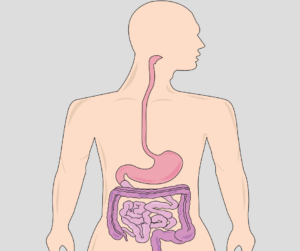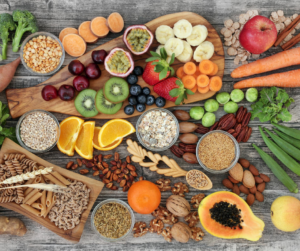Do you find yourself struggling with gastrointestinal issues such as stomach pain, heartburn/reflux, diarrhea, constipation, bloating, or all of the above? You are not alone! According to a nationally representative survey, around 61% of Americans report at least one bad GI symptom per week — many of which are not being treated by medical professionals. While there isn’t one particular diet that helps resolve these symptoms for everyone, there are a few tried and true methods that can get you on the path to feeling better.
Stress & Gastrointestinal Health

This one is often easier said than done, but it can play a huge role in improving your gastrointestinal symptoms. We aren’t asking you to live a stress-free life entirely, but aim to find things that will help to control the amount you feel on a day-to-day basis. For some people, yoga and meditation are the best ways to manage the pressures of life. For others, going on a relaxing walk, spending time with friends and/or family, being outdoors, or finding a hobby is much more impactful.
Exercise & GI Health
A sedentary lifestyle can keep things sedentary in your gastrointestinal tract, so you may find that increasing physical activity will help to improve your bowel movements. Additionally, increasing your activity levels has been shown to reduce stress, so consider this recommendation a two-for-one in terms of GI relief!
Mindfulness & Gastrointestinal Health
We live in a very fast-paced society, but eating quickly to accommodate this lifestyle is likely contributing to your GI discomfort. When we eat quickly, we often overeat and neglect to properly chew our food. This can lead to feelings of being overly full and bloated, and can also contribute to reflux.
These feelings can also occur when we eat in an environment that does not allow us to focus on the food (i.e. when we eat in front of the computer or the television). Try to focus on the plate/bowl in front of you, and take your time with the meal. Be sure to adequately chew each bite and truly savor the flavor of whatever it is you’re eating. This will allow your brain and stomach to communicate better, and will likely prevent you from feeling overly full.
Fiber & GI Health

While adding fiber to your diet is important, it’s also important to ensure that you do so slowly. One thing to keep in mind is that not all fiber is created equally: There is soluble fiber and there is also insoluble fiber. The soluble fiber attracts water and turns to gel, which slows digestion down. This type of fiber is found in oat bran, barley, nuts, seeds, beans, lentils, peas, and some fruits and vegetables.
Insoluble fiber acts more as a bulking agent for stool to help it pass more quickly through the stomach and the intestinal tract. This type of fiber can be found in foods such as wheat bran, vegetables, and whole grains. Many fruits and vegetables contain both types of fiber in varying ratios, so it is important to eat a variety. Keep in mind that increasing your fiber too quickly may exacerbate your gastrointestinal issues, so add it slowly to prevent additional bloating and discomfort.
Nutrition HealthWorks’ Registered Dietitians for GI Health
While these tips are helpful for decreasing GI symptoms in many people, it is possible that you may need additional intervention to help you feel your best. More importantly, it is imperative that you make sure you are getting adequate nutrition for what your body needs.
At Nutrition HealthWorks, our registered dietitians work closely with clients to help them achieve their wellness goals through personalized nutrition plans. We can help you adjust your diet and physical activity to prevent gastrointestinal discomfort. Schedule a session with a registered dietitian today to get your GI health back on track!
